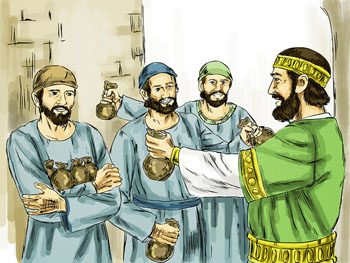The Stewardship Foundation was founded on the Judeo-Christian principle of stewardship. The idea for the foundation grew from our firm belief that certain highly-principled Christians, Jews, and yes, others, with money to invest or property to use for charitable means wanted a like-minded investment firm they could trust for advice and counsel. The outcome of their investments and charitable giving had to be in accordance with God’s natural law of morality and based on Jesus’ teachings.
 Most of us consider stewardship as a theological belief that humans are responsible for the world, and should take care of it. There’s much talk of caring for creation—the animals and the environment—and many charitable opportunities for these things. In Genesis 2:15 it is written, “The LORD God then took the man and settled him in the garden of Eden, to cultivate and care for it.” So we are driven to “serve the garden in which we have been placed” and we apply this to our ways of life, teach it to our children, and practice it in our politics.
Most of us consider stewardship as a theological belief that humans are responsible for the world, and should take care of it. There’s much talk of caring for creation—the animals and the environment—and many charitable opportunities for these things. In Genesis 2:15 it is written, “The LORD God then took the man and settled him in the garden of Eden, to cultivate and care for it.” So we are driven to “serve the garden in which we have been placed” and we apply this to our ways of life, teach it to our children, and practice it in our politics.
A broader concept of stewardship is illustrated in Jesus’ parable of the “talents,” and it’s this lesson on which the Stewardship Foundation’s name was sourced. The verses are often considered to be read by replacing the word “talents” with “abilities,” but we don’t. There is a good lesson; we believe that the message of the Gospel about the use of money earned is clear.
Matthew 25:14-30…
“It will be as when a man who was going on a journey called in his servants and entrusted his possessions to them. To one he gave five talents; to another, two; to a third, one—to each according to his ability. Then he went away.
Immediately the one who received five talents went and traded with them, and made another five. Likewise, the one who received two made another two. But the man who received one went off and dug a hole in the ground and buried his master’s money.
After a long time the master of those servants came back and settled accounts with them. The one who had received five talents came forward bringing the additional five. He said, ‘Master, you gave me five talents. See, I have made five more. His master said to him, ‘Well done, my good and faithful servant. Since you were faithful in small matters, I will give you great responsibilities. Come, share your master’s joy. Then the one who had received two talents also came forward and said, ‘Master, you gave me two talents. See, I have made two more.’ His master said to him, ‘Well done, my good and faithful servant. Since you were faithful in small matters, I will give you great responsibilities. Come, share your master’s joy.’
Then the one who had received the one talent came forward and said, ‘Master, I knew you were a demanding person, harvesting where you did not plant and gathering where you did not scatter; so out of fear I went off and buried your talent in the ground. Here it is back.’ His master said to him in reply, ‘You wicked, lazy servant! So you knew that I harvest where I did not plant and gather where I did not scatter? Should you not then have put my money in the bank so that I could have got it back with interest on my return? Now then! Take the talent from him and give it to the one with ten. For to everyone who has, more will be given and he will grow rich; but from the one who has not, even what he has will be taken away.”
A talent in Biblical times was a monetary unit worth about 20 years’ worth of wages for a person’s labor. He spoke this parable after talking about His second coming and that no one knows the day or the hour so we must use our “talents” to the best of our abilities as if Jesus was returning today. Let us all use our money not for ourselves so much, but for the glory of God. This means, using it to help others financially to accomplish His will, not just for ourselves.